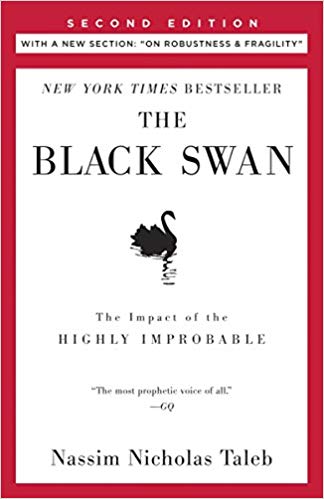

This article is an excerpt from the Shortform summary of "The Black Swan" by Nassim Taleb. Shortform has the world's best summaries of books you should be reading.
Like this article? Sign up for a free trial here .
In an unpredictable world, why plan? Is there a way to prepare for unexpected events, even if we can’t exactly plan for them? Why is planning important?
We’ll look at the concept of Nassim Nicholas Taleb’s “black swan” and explore why planning is important, even if the world is unpredictable.
Why Planning Is Important
Black Swans are extremely unpredictable events that have massive impacts on human society. Some examples of Black Swan events include World Wars I and II, the fall of the Berlin Wall, 9/11, the rise of the Internet, the stock-market crash of 1987, and the 2008 financial crisis. Black swans are rare but they happen, and we can’t plan for them. So why plan?
Taleb’s thesis is that Black Swans, far from being insignificant or unworthy of systematic study, comprise the most significant phenomena in human history. We should study them, even if we can’t predict them. Thus, counter-intuitively, we would be better served by concentrating our intellectual energies on what we don’t—nay, can’t—know, rather than on what we do and can know. Even if we can’t predict black swans, we can prepare for them–in other words, we can plan for them. If we don’t, we’ll be blindsided. This is why planning is important.
Why Plan?
If prediction is impossible, and any human attempt to predict is ultimately futile, why do we continue to make forecasts or plans for the future? Why plan?
First, it’s important to note that there are some areas of human experience where prediction is more viable than others. For example, the physical sciences have an enviable track record in terms of predicting phenomena, from the subatomic to the cosmic. Planning is important in the areas we actually can predict.
But second, there is evidence that humans are biologically conditioned to anticipate. In fact, it’s possible that our ability to imagine future consequences from present actions—an essential benefit of having consciousness—is the evolutionary advantage that allowed us to develop into the earth’s most advanced species. Why plan? It’s human’s superpower.
This advantage only serves us so far, however. In terms of avoiding immediate harm, our capacity for anticipation is essential. But when we try to anticipate the long-term workings of dynamical systems, we inevitably get ourselves into trouble. But we shouldn’t give up planning altogether. When wondering, Why plan?, thinking about preparing rather than planning.
If You Can’t Predict or Plan, How Do You Deal with Uncertainty?
Although Taleb is far more concerned with explaining why prediction is impossible than he is with proposing alternatives or solutions, he does offer some strategies for dealing with radical uncertainty. This is why planning is important.
1) Don’t Sweat the Small Predictions
When it comes to low-stakes, everyday predictions—about the weather, say, or the outcome of a baseball game—there’s no harm in indulging our natural penchant for prediction and planning: If we’re wrong, the repercussions are minimal. It’s when we make large-scale predictions and incur real risk on their basis that we get into trouble.
2) Maximize Possibilities for Positive Black Swans
We can optimize our opportunities for success. This is why planning is important. Although the most memorable Black Swans are typically the negatively disruptive ones, Black Swans can also be serendipitous. (Shortform note: Love at first sight is an example of a serendipitous Black Swan.)
Two strategies for opening ourselves up to positive Black Swans are (1) sociability and (2) proactiveness when presented with an opportunity. Sociability puts us in the company of others who may be in a position to help us—we never know where a casual conversation might lead. And proactiveness—for example, taking up a successful acquaintance on an invitation to have coffee—ensures we’ll never miss our lucky break. This is why planning is important–it allows us to take advantage of chance.
3) Adopt the “Barbell Strategy”
When Taleb was a trader, he pursued an idiosyncratic investment strategy to inoculate himself against a financial Black Swan. He devoted 85%–90% of his portfolio to extremely safe instruments (Treasury bills, for example) and made extremely risky bets—in venture-capital portfolios, for example—with the remaining 10%–15%. (Another variation on the strategy is to have a highly speculative portfolio but to insure yourself against losses greater than 15%.) This is why planning is important. The high-risk portion of Taleb’s portfolio was highly diversified: He wanted to place as many small bets as possible to increase the odds of a Black Swan paying off in his favor.
The “barbell strategy” is designed to minimize the pain of a negative Black Swan while, potentially, reaping a positive Black Swan’s benefits. If the market collapses, a person pursuing this strategy isn’t hurt beneath the “floor” of the safe investments (say, 85%), but if the market explodes, he has a chance to capitalize by virtue of the speculative bets.
4) Distinguish Between Positive Contingencies and Negative Ones
Different areas of society have different exposure to Black Swans, both positive and negative. For example, scientific research and moviemaking are “positive Black Swan areas”—catastrophes are rare, and there is always the possibility of smashing success. The stock market or catastrophe insurance, meanwhile, are “negative Black Swan areas”—upsides are relatively modest compared to the possibility of financial ruin.
Suffice it to say, we should take more risks in a positive Black Swan area than in a negative Black Swan one. Why plan? You can plan the way you risk, which will increase your chances of a positive outcome.
5) Prepare, Don’t Predict
Because Black Swans are, by definition, unpredictable, we’re better off preparing for the widest range of contingencies than predicting specific events. This is another reason planning is important.
That’s because, though Black Swans themselves can never be predicted, their effects can be. For example, no one can predict when an earthquake will strike, but one can know what its effects will be and prepare adequately to handle them.
The same goes for an economic recession. No one can predict precisely when one will occur, but, using the “barbell strategy” or some other means of mitigating risk, we can at least be prepared for one. This is why planning is important.
———End of Preview———

Like what you just read? Read the rest of the world's best summary of "Black Swan" at Shortform . Learn the book's critical concepts in 20 minutes or less .
Here's what you'll find in our full Black Swan summary :
- Why world-changing events are unpredictable, and how to deal with them
- Why you can't trust experts, especially the confident ones
- The best investment strategy to take advantage of black swants






